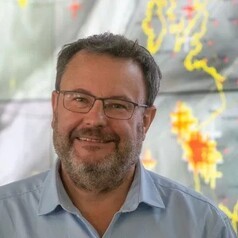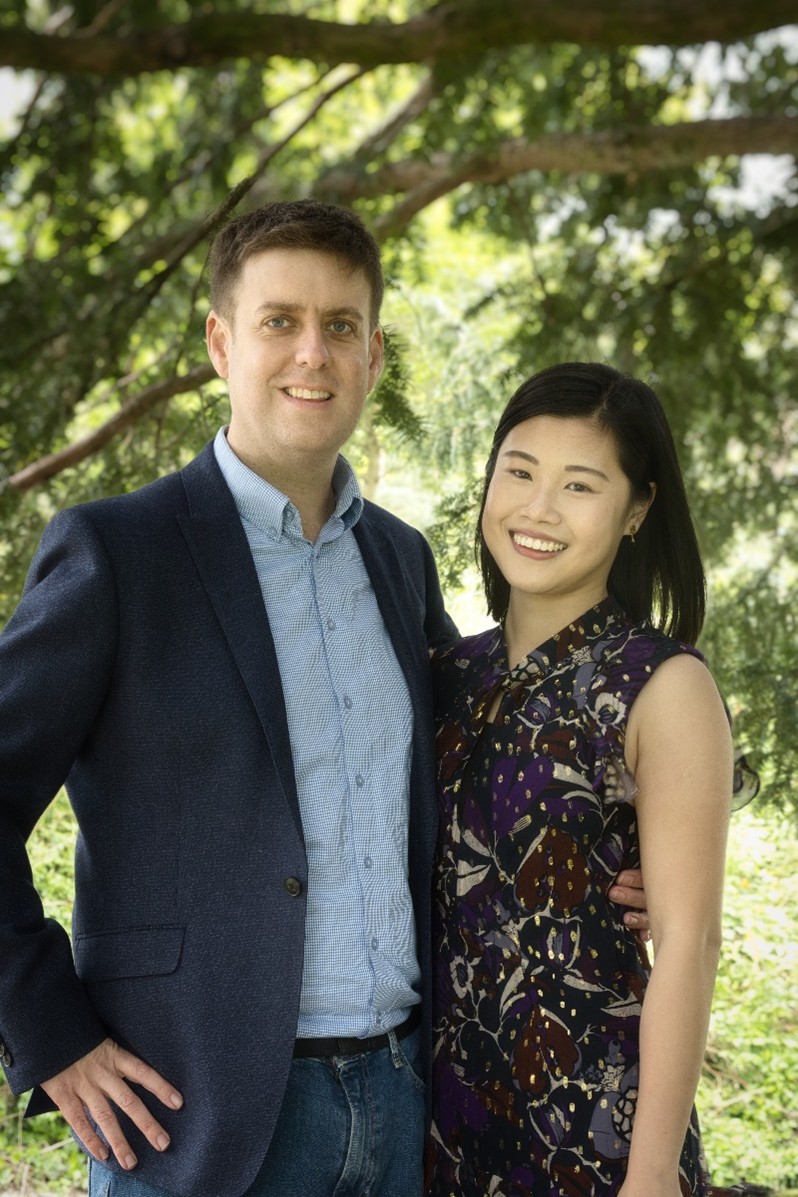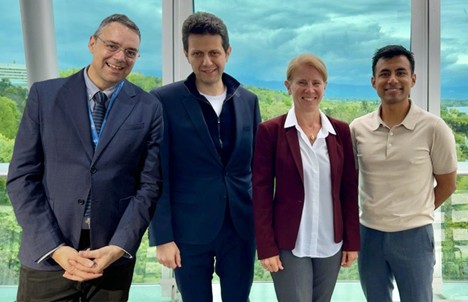Awards for Impact on Science, Policy or Society 2024
Professor Paul Davies is the Chief Meteorologist, Principal Fellow of Meteorology, Head of Profession, and Head of the Climate Extremes team at the UK Met Office. He is a Visiting Professor of Practice at Newcastle and Salford Universities and is internationally recognized as an authority in operational meteorology and impact-based forecasting. With over 25 years of expertise, he has driven scientific and technological innovations to enhance weather prediction and impact-based warning services across Government, Industry, and the Public. Paul advises senior Government and Industry leaders, briefs COBRA and SAGE, and serves as an expert witness in weather-related investigations. He provides critical advice at the highest levels, including to Permanent Secretaries, Secretaries of State, and Directors of Critical National Infrastructure. His expertise is frequently sought in parliamentary inquiries and to select committees.
Paul played a key role in establishing the Met Office/EA Flood Forecasting Centre (FFC) in 2007, serving as Chief Hydrometeorologist and Deputy Head. He founded the UK’s first operational hydrometeorological profession and led the creation of the Met Office Hazards Centre in 2010. As inaugural Chair of the Natural Hazards Partnership, he coordinated efforts across 20 agencies and government departments. Paul was a member of the UK National Flood Resilience Review Scientific Advisory Group and has advised on critical resilience programs, including Network Rail’s Weather Advisory Task Force following the 2020 Stonehaven accident. He was also part of the Extreme Heat Task Force after the July 2022 heatwave, working to improve UK rail resilience.
Paul is a strategic voice for the Met Office, engaging with private sector partners, universities, and global organizations such as EUMETNET, EUMETSAT, the World Bank, UNDRR, UNDP, and WMO. His expertise is reflected in his authorship of an article with 30 global scientists on advancing weather and climate forecasting in the Bulletin of the American Meteorological Society (https://doi.org/10.1175/BAMS-D-21-0262.1).
At the UN and WMO, Paul holds multiple leadership roles in global meteorology and impact forecasting. He was the lead author of WMO’s Multi-Hazard Impact-Based Forecasting and Risk-Based Warnings guidelines and chaired WMO’s IMPACT task team. He has been instrumental in many international initiatives, including the UN’s Weather Forecasts for All program, and chaired the WMO expert team on Cataloguing Hazardous Events (CHE) to improve cost-loss attribution. He remains active in disaster risk reduction through WMO’s Standing Committee for DRR and continues to shape global weather forecasting and resilience strategies.
In summary, Paul Davies exemplifies distinguished work in meteorology through his research, public engagement, and service to the meteorological community. His contributions have not only advanced the science of meteorology but have also made a lasting impact on society's resilience to weather-related challenges.

Acceptance Message
It is a pleasure and privilege to receive the 2024 RMetS Fitzroy Award for Professional Meteorology.
This is both a proud and humbling moment for me as my long Met Office career comes to an end in 2025. While my own contributions feel modest compared to the incredible achievements of those honoured before me, this award recognises the dedication and talent of my colleagues and those who I have had the pleasure to work with during my 30 or so years as a professional meteorologist.
I have observed many profound changes; technologically, scientifically and personally during my time as a Chief Meteorologist, but what is most striking is that I didn’t anticipate the rapid pace of climate change, nor did I appreciate the difficulty in developing and implementing sustainable services that instil user action. This gap between climate change induced impacts and our ability to mitigate appears to be growing. I am convinced that it is only through shortening the route from experimentation to execution, embracing transdisciplinary partnerships, and creating an environment through living labs that we will start to make headway in narrowing this gap.
The award citation also shows what can be achieved if one has the curiosity and professional drive to make a difference and the willingness to accept support and encouragement from others. In my case, this support came from colleagues and peers in the Met Office, RMetS, WMO/UN and from Newcastle and Salford universities, for which I am truly grateful.
Professor Dann Mitchell and the health research team at Bristol Climate Change Group have created significant and lasting impact across the public, academic and policy domains, sustained over a number of years. This has led directly to improved information for policy makers and planners.
The impact is based on a strong foundation of pioneering climate science. For instance, Dann was a major driving force in setting up and establishing the HAPPI project, which provided new evidence on the benefits of limiting global warming to no more than 1.5C above pre-industrial levels, compared to 2C. More recently, his focus on health has helped us better understand the link between weather and climate hazards and mortality (e.g. https://doi.org/10.1016/S2542-5196(24)00175-X), filling an important evidence gap. Both examples combined excellent science, with open collaboration and clear and authoritative communication.
Working with the Met Office, as the University of Bristol Joint Chair for the Met Office Academic Partnership, Dann has helped to galvanise the research community around key gaps in research, providing a focal point for discussion on climate and health and informing the Met Office weather-climate-health strategy.
Dann’s work is creating impact by feeding directly into policy and planning. For instance, he is currently one of the lead authors for the health chapter for the technical report of the independent assessment for the fourth UK Climate Change Risk Assessment. Working with risk-owners across government he has already helped to produce updated descriptors of health risks and is now working with his co-lead and team of authors to quantify the levels of risk. This will ultimately form an important ingredient to improved national adaptation planning for climate driven health risks.
Finally, Dann provides a highly valued and useful community service as one of the instigators and ongoing organisers of the climate impacts national meetings. These have provided a great opportunity to learn about new research and network with colleagues across a range of disciplines, often amplifying the reach and impact of the research findings for colleagues at all stages of their career development.

Dann Mitchell and Eunice Lo.
Acceptance Message
We are thrilled to have been chosen for this Impact Award. It is an incredible feeling that as academics we can see our published work helping society in meaningful and positive ways. In our case, this was done through health protection, policy engagement and through strengthening the impact of climate on health in legal settings. The award is for climate change and health research from our team in Bristol, which is made up of climate scientists, epidemiologists, clinicians, and social scientists, and of course many of the impact we rely on has come from different individuals within this team - so this award is very much for all of them too. We and the wider team feel it is a pleasure and a privilege to be recognised by the Royal Meteorological Society in this way, and hope that our research impact continues to grow over the coming decades.
Gianpaolo Balsamo is leading the Climate Infrastructure within the World Meteorological Organization. This includes all the climate-relevant observations, from satellite and surface-based networks, as well as the global modelling and monitoring systems with growing role of AI, empowering decision makers with evidence-based information. Gianpaolo role as the director of the Global Greenhouse Gas Watch flagship is to coordinate an ambition climate change mitigation plan involving science, infrastructure and services in support of climate action. He was formerly a principal scientist in the Earth system modelling section of the European Centre for Medium-range Weather Forecast (ECMWF), the world leader in weather forecasting and climate reanalyses. Gianpaolo Balsamo’s contributed to AskWMO by shaping the concept of the platform, supporting the process of documents selection, the testing, and the implementation of the tool alongside the development of one of WMO’s flagship initiative.
Jesse Cruz’s contribution to this initiative centers on enhancing WMO’s digital communication strategy within the UN 2.0 framework, with a focus on fostering an agile, forward-thinking culture that values curiosity, learning, and the digital skills needed to amplify impact. In alignment with the “quintet of change,” Jesse aims to create a dynamic, inclusive digital environment where innovative approaches to communication, AI, and engagement can thrive. This approach not only strengthens WMO’s digital presence but also reinforces its position as a trusted authority on climate, weather, and water, empowering audiences worldwide to respond effectively to global challenges.
For decades, Brigitte Perrin has been a passionate advocate for scientific communication. A journalist by training and a communicator by vocation, her career path led her to audit and develop the communication strategy of several UN bodies, leading to a significant shift in the way those organizations talk with their public and use innovative tools. As lead of strategic communication at the World Meteorological Organization since 2021, Brigitte has harnessed the power of artificial intelligence - often used to disseminate disinformation – in the WMO digital communication to promote authoritative knowledge on climate, way beyond the traditional realm of media and public relations. Earlier on, Brigitte had worked for several years in the academic sector, supporting scholars in their delivery of innovative vehicles for knowledge, including during crisis times such as the pandemic. With this project, Brigitte aims at using WMO’s foundational knowledge base for a better understanding of the science and stake of the current climate state. As part of the UN-wide initiative for information integrity on climate, WMO is a key player to develop innovative tools against dis- and misinformation. Brigitte sees the legitimacy of meteorology and machine learning, pioneers in AI, as a stepping stone to develop AI for public information.
Ario Saeid Vaghefi is an AI and Climate Consultant for the World Meteorological Organization, where he supports the integration of AI technologies into global meteorological practices. He specializes in creating synergies between AI innovation and operational climate services, ensuring their effective implementation. Ario Saeid Vaghefi is specialized in data science, climatology, and hydrology with a background in civil engineering and mathematics.
Ario Saeid Vaghefi has over 8 years of experience in data analysis, experiment design, model development, documentation, validation, implementation, and maintenance of machine learning products. He is a member of the Sustainable and Resilient Economy AI Lab "sureal.ai" steering committee. He is also an affiliated researcher at the Oxford Sustainable Finance Group, where he collaborates with experts and stakeholders to advance the use of NLP for sustainable finance. Ario Saeid Vaghefi is passionate about applying his expertise to tackle global challenges and create positive impacts. His approach to the development of askWMO is to ensure that state-of-the-art technologies are embedded, allowing it to benefit from new and upcoming advancements and research. Ario Saeid Vaghefi leads various projects at the intersection of AI, NLP, and climate change at the University of Zurich and publishes in AI and Computational Linguistics conferences.

Left to right: Gianpaolo, Saeid, Brigitte, Jesse
Acceptance Message
We are extremely honoured to receive the Royal Meteorological Society (RMetS) Award for the askWMO project.
This recognition not only affirms the value of our work but also highlights the growing importance of AI-driven solutions in enhancing access to authoritative climate and meteorological information. We are especially proud to see how our efforts are already benefiting the scientific community by making climate, weather, and water information more accessible, understandable, and actionable.
WMO demands not only technical excellence but also meaningful engagement with the community owning the knowledge base. Such tools, even deployed to a limited audience, touch the very core of our scientific identity: data, knowledge, and international cooperation.
We extend our heartfelt thanks to all colleagues and partners who made this achievement possible.

